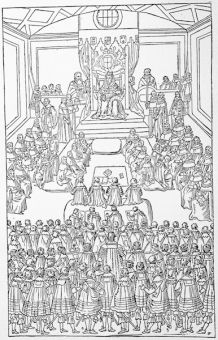
The Throgmorton Plot
French policy [in the 1580s] was complicated by the fact that King Henry III and the court party, while they would have liked to crush the Huguenot heresy, detested still more the political ascendency of the Guise faction, which for family reasons ardently favoured the cause of Mary Stuart. Moreover the Guises and their extreme supporters were ready, in their religious fanaticism, to go so far as to seek, though not yet openly, an understanding with Spain. The criminal folly of Alencon strengthened the Guises. Hence developed the Throgmorton Plot, which as a matter of course was detected and dealt with at the beginning of 1584.
The Guises, sundry English Catholics, and the Spanish ambassador in England, Mendoza, were involved in a scheme for a Guise invasion, of course with the object of setting Mary on the throne. As usual there was no definite proof produced of personal complicity on the part of the imprisoned queen. There was no possible reason why she should be dragged into it.
But quite enough was revealed to intensify the common feeling that Elizabeth's security demanded Mary's death, and to warrant also redoubled severity in applying the penal laws; while Mendoza was ordered to leave the country.
Alencon's death made the Huguenot Henry of Navarre heir-presumptive to the French throne, a prospect intolerable to the Guises, and to Henry III only more tolerable than the Guise ascendency. Hence France was practically barred from adopting any active foreign policy whatever. On the other hand, the assassination of William of Orange, the great leader of the Dutch Protestants, threatened to destroy the Dutch resistance of which he had been both the soul and the brain, while it emphasised the unscrupulous methods of Philip of Spain.
Manifestly the English people were ready to espouse the Dutch cause whole-heartedly; had they been allowed to do so the French court party would probably have made common cause with them in association with the Huguenots.
The restraining factor was Elizabeth herself, with her passion for abstaining from any course which so committed her that she could not withdraw. The grim unanimity of the nation found expression in the formation of "The Association," which might be called a voluntary league of EnglishÂmen sworn to put to death any one concerned in any plot against the queen, and any one — meaning of course Queen Mary — in whose favour such a plot should be formed.
Elizabeth herself, however, insisted that for such a person exclusion from the succession should be the penalty. At the same time, while the queen, then as always, refused to recognise any specified person as her heir, arrangements were made for carrying on the governÂment in case of her sudden demise.
The Holy League
Now, however, the Guises openly proclaimed a Holy League, whose object was the exclusion of Henry of Navarre from the French succession. Henry the king, despairing of English support, joined hands with the League. Philip of Spain, reckoning that an Anglo-French alliance was now impossible, while Alexander of Parma was steadily and persistently pressing forward the subjugation of the Netherlands, sought to frighten England by the sudden seizure of all English ships upon his coasts.
Instead of frightening England, he kindled thereby a sudden flame of passionate defiance. Elizabeth was obliged to give way to the national feeling, and openly to league herÂself with the United Provinces. By the end of the year the Dutch had placed four of their ports in her hands, and an English army under Leicester's command had been landed in the Netherlands.
Drake's war
Leicester and his troops were to render no great service to the Dutch cause; but the declaration of war let Francis Drake loose against the Spaniards. On a private venture, though with government sanction, he sailed with a squadron first to the Spanish port of Vigo, captured some prizes, then betook himself to the West Indies, where be held first San Domingo and then Cartagena to ransom, and then returned home with an immense booty, having very efficiently demonstrated that English seamanÂship was fully competent to take the offensive against the might of Spain.
In the Netherlands, Leicester at the best was but an incompetent commander, and the English were really paralysed by the double dealing and contradictory instructions from the queen, which drove even Burleigh himself to threats of resignation. The one thing accomplished was a brilliant but perfectly useless feat of arms at the battle of Zutphen, where Philip Sidney fell, and dying, won immortal fame.
Leicester recalled
Leicester himself was recalled before the end of the year (1586), because, in flat contradiction to instructions, he accepted the formal governorship of the Netherlands, hoping thereby to restore in the Dutch the confidence which Elizabeth's suspected intrigues with Parma had destroyed.
This article is excerpted from the book, 'A History of the British Nation', by AD Innes, published in 1912 by TC & EC Jack, London. I picked up this delightful tome at a second-hand bookstore in Calgary, Canada, some years ago. Since it is now more than 70 years since Mr Innes's death in 1938, we are able to share the complete text of this book with Britain Express readers. Some of the author's views may be controversial by modern standards, particularly his attitudes towards other cultures and races, but it is worth reading as a period piece of British attitudes at the time of writing.
History
Prehistory - Roman
Britain - Dark Ages - Medieval
Britain - The Tudor Era - The
Stuarts - Georgian Britain - The Victorian Age